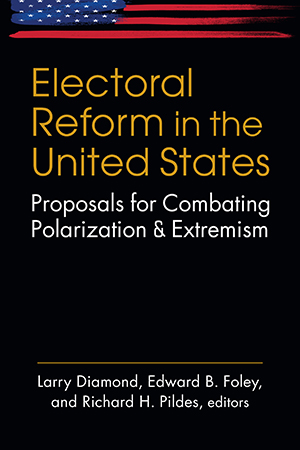Larry Diamond, Edward B. Foley, and Richard H. Pildes, editors
In the midst of the political ugliness that has become part of our everyday reality, are there steps that can be taken to counter polarization and extremism—practical steps that are acceptable across the political spectrum? To answer that question, starting from the premise that the way our political processes are designed inevitably creates incentives for certain styles of politics and candidates, the Task Force on American Electoral Reform spent two years exploring alternative ideas for reforming key aspects of the US electoral process. The results of their work are presented in this essential book.
Larry Diamond is Mosbacher Senior Fellow at the Freeman Spogli Institute and William L. Clayton Senior Fellow at the Hoover Institution, Stanford University.
Edward B. Foley is Ebersold Chair in Constitutional Law and director of Election Law program in the Moritz College of Law, Ohio State University.
Richard H. Pildes is Sudler Family Professor of Constitutional Law in the School of Law, New York University.
Open Access ebook: download here "Invaluable to those teaching election law or studying election reform.... Highly recommended." —Choice
"This volume is a treasure trove of ideas about how to make our electoral system better—less polarized, more responsive to citizens. In it, big thinkers discuss big ideas. Their analyses are rich, detailed, and incisive. This might very well turn out to be the book that launches a thousand reforms." —Costas Panagopoulos, Northeastern University
"At this time when distrust and partisanship are too often justifications for the status quo, the authors offer evidence-based, consensus-driven, achievable proposals to improve governance in the United States. Anyone interested in reforming US democracy should start here."—Derek T. Muller, Notre Dame Law School








